January 11, 2019
Air Date: January 11, 2019
FULL SHOW
SEGMENTS
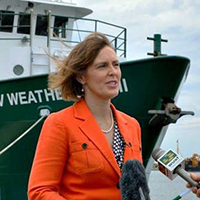
Capitol Hill Panel on Climate Crisis
View the page for this story
The House Select Committee on the Climate Crisis created January 2018 by House Speaker Nancy Pelosi will press for climate change to be taken into account for all House legislation, says its Chair Kathy Castor (D-FL). Congresswoman Castor tells Host Steve Curwood about priorities for the committee and how it will work with standing House committees including Science, Energy/Commerce and Transportation/ Infrastructure. (11:23)

Beyond The Headlines
/ Peter DykstraView the page for this story
In this week’s trip beyond the headlines, Peter Dykstra and Host Steve Curwood take a look at the parallels between the scandals of the EPA and Interior Department leadership during the Reagan and Trump presidencies. Then, the pair looks back to the Great Boston Molasses Flood in 1919. (03:46)

Lead in Newark’s Water
View the page for this story
Since the widely-publicized scandal of lead in the drinking water of Flint, Michigan, much has come to light about the high levels of lead in water supplies across the US. In Newark, New Jersey, hundreds of thousands of citizens may be at risk of exposure to lead in their water, and the city recently started handing out water filters to its citizens after plans to replace the lead piping system became stalled. Erik Olson, the Natural Resources Defense Council’s Senior Director of Health and Food joins Living on Earth’s Bobby Bascomb to talk about the lead water crisis. (10:48)

'Forest Bathing' for Health
/ Kara HolsoppleView the page for this story
A walk in the woods might be just what your health provider ordered. Numerous studies suggest that taking in the peaceful atmosphere of a forest can have significant health benefits. Now the practice of “forest bathing,” which originated in Japan in the 1980s as a form of nature therapy, is becoming more popular around the world. From a forested Pittsburgh park, Kara Holsopple reports on this practice for the Allegheny Front. (05:58)
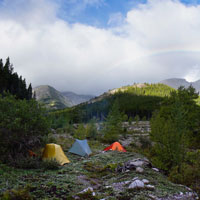
The Conservation Costs of Shutdowns
View the page for this story
The government shutdown during the Trump administration began on December 22nd, 2018. In the ensuing weeks, concerns have grown about impacts on the nation’s public lands from the National Mall to Joshua Tree National Park. The facilities are critically understaffed when furloughed employees stay home. Problems include overflowing trash cans, illegal off-roading, poaching of animals and plants, and theft of artifacts as well as safety risks for park visitors. Former Secretary of the Interior Sally Jewell joins Host Steve Curwood to discuss how our national parks, forests, and other federal public lands have been affected by shutdowns. (13:53)
Show Credits and Funders
Show Transcript
HOSTS: Steve Curwood
GUESTS: Kathy Castor, Sally Jewell, Erik Olson
REPORTERS: Peter Dykstra, Kara Holsopple
[THEME]
CURWOOD: From Public Radio International – this is Living On Earth.
[THEME]
CURWOOD: I’m Steve Curwood.
Former Interior Secretary Sally Jewell tells us how government shutdowns are devastating for our national parks, monuments, forests and other public lands.
JEWELL: To have the parks open to have people running roughshod over them without the ability to appropriately care for them or interpret them is really a travesty.
CURWOOD: Also, in the spirit of biophilia, and loving the outdoors we look at the Japanese tradition of forest bathing as a tool for staying healthy.
SHERMAN: If you do one session of forest bathing for even 20 minutes we see an increase in the NK cells or the natural killer cells and these are the cells that protect us from viruses and even from tumor formations.
CURWOOD: And if you’re short of time, even a few minutes under a tree can help. Those stories this week on Living on Earth, Stick Around!
[NEWSBREAK MUSIC: Boards Of Canada “Zoetrope” from “In A Beautiful Place Out In The Country” (Warp Records 2000)]
[THEME]
Capitol Hill Panel on Climate Crisis
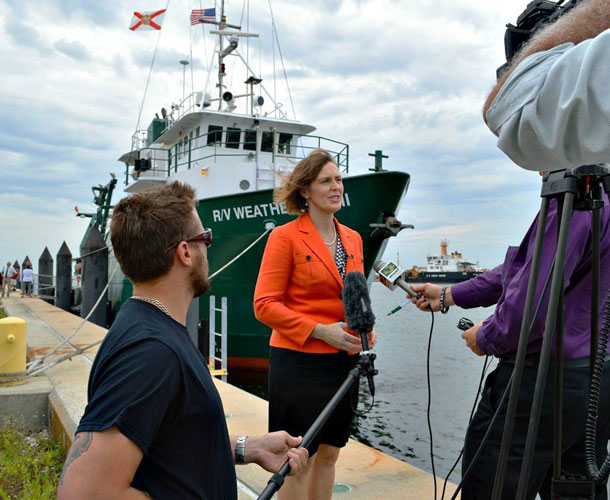
Rep. Castor (D-FL) spoke to reporters at a Deepwater Horizon disaster anniversary event in 2015. (Photo: courtesy of Rep. Kathy Castor)
CURWOOD: From PRI and the Jennifer and Ted Stanley Studios at the University of Massachusetts Boston, this is Living on Earth. I’m Steve Curwood.
The Democratic majority in the House of the US Congress now has what it calls the Select Committee on the Climate Crisis. This committee has limited powers, but will work with more general standing committees that can compel witnesses and vote on bills. Among its duties, the climate crisis committee is the forum for distilling the calls for a green new deal into an actual set of program proposals. House Speaker Nancy Pelosi appointed Kathy Castor, a seventh-term Congresswoman from Florida to chair the Select Climate Crisis Committee. Congresswoman Castor has pledged not to take donations from the fossil fuel industry and has sold a mutual fund holding in the utility sector critics had questioned. Kathy Castor joins me now from her Tampa office. Welcome to Living on Earth!
CASTOR: Thank you, Steve.
CURWOOD: So tell me, Congresswoman Castor. How did you feel when Speaker Pelosi asked you to chair the House Select Committee on the climate crisis?
CASTOR: I'm very humbled with Speaker Pelosi's confidence in me to lead this re-instituted Select Committee on the Climate Crisis. We have a major challenge ahead. I was in the Congress when we tackled climate change before through the Recovery Act, and then through ACES. That was the American Clean Energy and Security Act. But now the threat of climate change, the cost of the warming planet really present us with a major challenge ahead.
CURWOOD: Tell me about the climate change threats and impacts in your own district, the Florida's 14th which includes the Tampa Bay area. What's that experiencing?
CASTOR: The Tampa Bay area and is known for now as being one of the most vulnerable to rising tides and storm surge if we were to be pounded by a major hurricane. There is nothing like having to evacuate out of your home like I had to do when Hurricane Irma was bearing down last year, taking all of the family pictures and photo albums, putting them in the back of the car and driving them to the top of a parking garage nearby.
What I've seen during my lifetime is a changing threat. It's more dire now. The waters are warmer. The storm surge threat is more serious. These extreme weather events are upon us. It's not something in the distant future. It is the here and now. Also, what I've seen is huge new costs being foisted on to everyday Americans, and from a Florida standpoint, that's meant paying more for your air conditioning bills, property insurance, flood insurance rates going up, and the cost of having now your property taxes to go to fixing infrastructure, and updating infrastructure, because the threats are different, beach re-nourishment. And in Congress, we're now laying out billions of dollars every term to respond to extreme weather events as well.
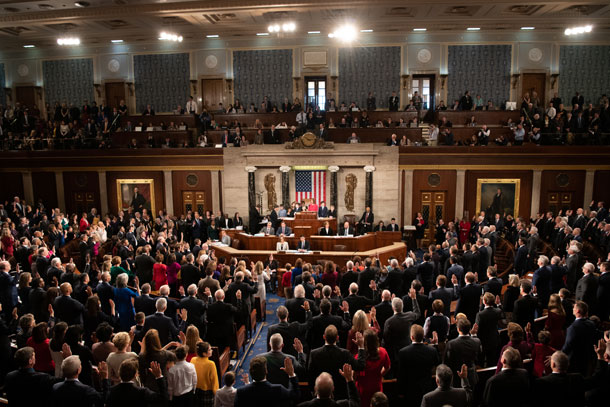
434 lawmakers, including 89 new members, were sworn in to the 116th Congress on January 3rd, 2019. (Photo: Phi Nguyen, House of Representatives)
CURWOOD: So, with the House Select Committee on the Climate Crisis that you're now chairing, what are some of your first priorities for this committee?
CASTOR: The committee will press for urgent action to dramatically reduce carbon pollution in defense of America. And we're going to accomplish as much as we can legislatively to establish new national policies. But we know that that's a daunting task. With President Trump still in the White House, and the GOP still in control of the United States Senate, I anticipate there will be some roadblocks to action. So, we will do as much as we possibly can to press and prod to reduce carbon pollution from all sectors. But then I think we're going to shine the light on communities across the country that are well ahead of the US Congress and the Trump administration that are dramatically reducing carbon pollution to try to hold them up as examples to national government and to other communities across the country.
CURWOOD: Sounds like you might be traveling around the country then and having hearings in these communities.
CASTOR: We absolutely will. There are very conservative communities that are going carbon free. They need to be held up as a good example. There are some communities that are stuck in the mud. There are some states like the state of Florida, frankly, that are way behind when it comes to energy efficiency policies, renewable energy policies and carbon reduction. We want to shine the light on them as well.
CURWOOD: You've been quoted as saying that your committee needs to be bipartisan. So, what kinds of the aspects of climate disruption do you think can help bridge the gap across the island within the House?
CASTOR: I think we can build coalitions on fuel economy standards. This, if you recall, just recently, the Trump administration said America we're going to go backwards. Consumers, we're going to go backwards when it comes to fuel economy. Most of the automakers, and most of my GOP colleagues were not pushing for that for rollbacks. Everyone kind of understands that decade after decade, we've made substantial progress reducing costs for consumers and making our cars more efficient and reducing carbon through American ingenuity and innovation. And I would hope that fuel economy is one area where we can find some bipartisan support. Our national laboratories are the best in the world. And they have a lot of bipartisan support. The technologies on carbon reduction and energy efficiency being produced by our national laboratories now has to be taken to market through partnerships with businesses. We have the cutting edge technology, and I think that a lot of my GOP colleagues will be very interested in greater investments in what's coming out of our national laboratories on carbon reduction.
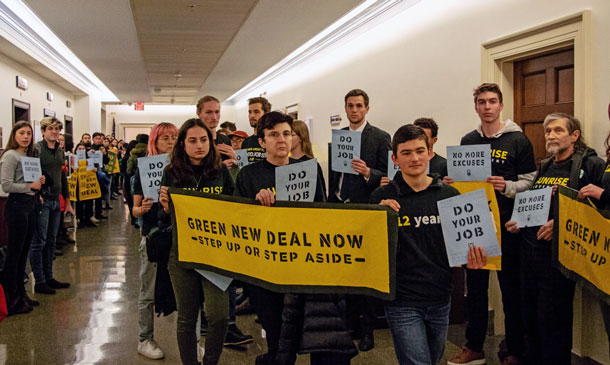
More than 1,000 youth activists calling for a Select Committee on a Green New Deal staged a sit-in outside Congressional offices on December 10th, 2018. Speaker Pelosi declined to create a separate committee to legislate a Green New Deal but did form the House Select Committee on the Climate Crisis to hold hearings and curate proposals. (Photo: Becker1999, Flickr CC BY 2.0)
CURWOOD: You mentioned the push by the Trump administration against the fuel economy standards for vehicles. That would seem to be in the interest of oil companies, both at home and also folks like the Russians in the Saudis, who export a lot of oil for mobile transport.
CASTOR: Yeah, it's really anti-American rolling back our fuel economy standards, because you're just reaching into the pocketbooks of every American family and passing those dollars on to dirty oil interests and fossil fuel companies. We now know based on some reporting, that it was the fossil fuel companies, big oil companies that weighed in with the Trump administration, and unfortunately, their profits won the day over the people's interest. So, we've got to bring public opinion to bear now to shift back on that decision.
CURWOOD: I imagine the oil companies are worried they're not gonna be able to sell their product in a few years?
CASTOR: Well, they're going to have to go through a dramatic transition, and you're seeing it already in the state of Texas where oil has always been king. Now, wind power a renewable, clean wind power is growing by leaps and bounds in the state of Texas. Solar power across the United States growing by leaps and bounds, and there's going to be a significant transition among electric utilities and energy companies, but they need to push. They need to push. If we do not have national policies that press them to do this, boy, it's going to end up costing America and American families a whole lot more down the road.
CURWOOD: Now at this point, what do you know about which of your fellow members of Congress might join you on the Climate Crisis Committee and who might become the ranking member?
CASTOR: This is yet to be determined. I anticipate over the next week, maybe before the Dr. Martin Luther King Jr. Holiday we’ll know who is going to be serving on the committee. I hope that a number of the energetic passionate smart freshman members will come on to the committee to help lead the charge.
CURWOOD: Now, some of the freshmen, though, have expressed some skepticism about the committee, for example, Sean Casten, who just was elected from Illinois from the first time he's a person has been in the energy efficiency business. And he says, well, he'd be more interested in serving on the standing Energy and Commerce Committee than on the Select Committee on the Climate Crisis. How do you respond to somebody like that?
CASTOR: Well, we need representative Casten, and we need everyone to be weighing in. I have to say, I kind of agree with them. I've served in the Congress now for a number of terms, I'm skeptical too about the ability of Congress, with the GOP still in control the U.S Senate and the Trump administration to move the needle dramatically. But we do not have time to waste. We don't have time to spin our wheels, we have got to press and it's got to come from the select committee, that will be something of a focal point for pressing all of the standing committees for action, and then it will be up to the Energy and Commerce Committee, the Transportation Infrastructure [Committee], every single committee will have to have a climate piece on their agenda. And I anticipate the members of the select committee will press for every piece of legislation that comes to the floor of the house to be looked at through a green lens, does it help us reduce carbon pollution and put us in a better place and reducing greenhouse gas emissions? Or does it not? Every bill, every appropriation that comes before us.
CURWOOD: Now, Frank Pallone, who has been Ranking Member of the Energy and Commerce Committee is now the chair. He says he wants to have a hearing on climate right away at his committee. What is this portend in terms of potential turf battle versus maybe strategy of synergy?
CASTOR: No, it's a strategy of synergy. The last term I served as the Vice ranking Member of the Energy and Commerce Committee. So there is a great partnership there with Chairman Palone and the members of the Energy and Commerce Committee for action. I imagine we will have some joint hearings. If we ever need to issue a subpoena Chairman Palone has said we will work together to do that. And at the Energy and Commerce Committee over the past few terms, while the Republicans have been in charge, we asked for...we begged them for hearings on climate and the escalating costs of climate change, and they refused time and time again. So, there is a lot of pent up desire among the Democratic caucus and people across this country to begin to take action. And that's a great sign that Chairman Pallone said that's what he will do in his first hearing.
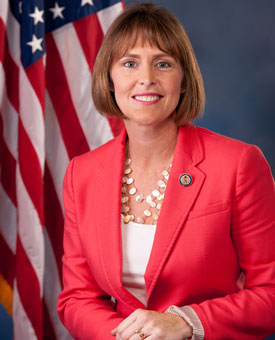
Rep. Kathy Castor (D-FL) is a seventh-term Congresswoman and Chair of the House Select Committee on the Climate Crisis. (Photo: United States Government, Wikimedia Commons, Public Domain)
CURWOOD: How optimistic are you that you can make progress given that, in fact, the Senate and the White House are still controlled by Republicans who have been very vocal in their skepticism of the dangers of climate disruption?
CASTOR: During my lifetime, I've seen America make dramatic improvements when it comes to clean air, clean water and acid rain. Now, with the climate crisis, that's just the most daunting challenge we've ever had. I'm optimistic that America can tackle this and preserve our way of life. I think we have a moral obligation to our kids and future generations to do it.
CURWOOD: Congresswoman Kathy Castor is serving her seventh term representing Florida's 14th district and she's chair now of the House Select Committee on the Climate Crisis. Congresswoman, thanks so much for taking the time with us today.
CASTOR: Thank you.
Related links:
- Rep. Kathy Castor’s statement on her appointment as Chair of the new Select Committee on the Climate Crisis
- USA TODAY | "Climate change: Meet the Florida congresswoman leading the House charge"
[MUSIC: Jacqueline Schwab, “The Blessings Of Mary,” on Down Came an Angel, traditional, Dorian Recordings]
CURWOOD: Coming up, lead in the drinking water of Newark, New Jersey. Stay tuned!
ANNOUNCER: Support for Living on Earth comes from Sailors for the Sea and Oceana. Helping boaters race clean, sail green and protect the seas they love. More information at sailors for the sea dot org.
[CUTAWAY MUSIC: Cyrus Chestnut, “Gospel Improv #1” on Spirit, by Cyrus Chestnut, Jazz Legacy Productions]
Beyond The Headlines
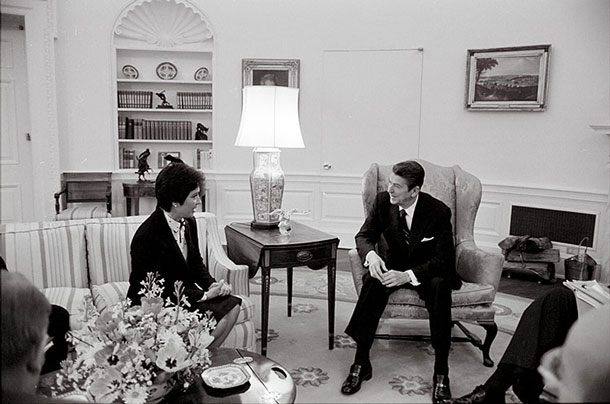
Ronald Reagan’s choice for EPA Administrator was Anne Gorsuch, who resigned her post following a charge from Congress that the EPA had mishandled the Superfund program. (Photo: Ronald Reagan Presidential Library, Wikimedia Commons, Public Domain)
CURWOOD: It’s Living on Earth, I’m Steve Curwood and it’s time for a trip now beyond the headlines with Peter Dykstra. Peter is an editor with Environmental Health News, that’s EHN dot org and Daily Climate dot org. Hey Peter, we haven’t spoken since before the holidays. Happy New Year, and how’s it going?
DYKSTRA: Happy New Year, Merry Christmas, and everything else, Steve. You know, it's been a while since we talked, like you said, and one of the things that happened during the break is that Ryan Zinke, the controversial Interior Secretary, resigned and that got me thinking about Ronald Reagan’s scandal-plagued picks to run both Interior and the EPA. It was the same playbook, slashed regulations, crushed agency morale, reduced budgets, but at least Ann Gorsuch, Reagan's EPA administrator and James Watt, who ran the Interior Department, were able to last into the third year of Ronald Reagan's presidency.
CURWOOD: That's right, and of course Ann Gorsuch brought up Neil Gorsuch, her son, with us today as a Supreme Court justice
DYKSTRA: And Scott Pruitt remained off the radar since his resignation from EPA back in July. He's reportedly working as a coal industry consultant now. He's barred from working as a lobbyist for five years as a former cabinet official, but both Pruitt and Zinke left a trail of unfinished investigations, some of which are falling into the lap of the Democratic-controlled House of Representatives.
CURWOOD: Yeah, let's focus on Zinke; I think he's spending a lot of money on lawyers these days
DYKSTRA: He is. It's unclear exactly how many investigations popped up for things like lavish expenditures on his office, lavish travel expenditures, security, and some shady deals involving real estate and his political cronies.
CURWOOD: And some of this stuff is really pretty serious, it's not just optics, the Justice Department is looking into it, right?
DYKSTRA: Right. There's the land deal in Ryan Zinke’s hometown, Whitefish, Montana. It involves Zinke and the oil industry giant Halliburton, and that one may trail Zinke well beyond his departure from government.
CURWOOD: Hey, I think I recall Whitefish as the location of that two-person firm that was briefly hired to oversee the rebuild of Puerto Rico's entire electric grid after Hurricane Maria.
DYKSTRA: That's right, Whitefish Energy was hired for $300 million. They were quickly dismissed, because the two guys in Whitefish, Montana were not up to the job. But they've gone on to snag other more modest federal contracts, raising eyebrows, not raising any other inquiries. Which brings us to another revelation about EPA. Each of EPA’s 10 US regions is snoozing at the enforcement switch. They dropped enforcement actions by 7% in EPA’s Midwest region, to 77% right here in the beautiful Southeast, and there's a similar decline in pollution fines that the agency's collected.
CURWOOD: That's a rather inelegant way to try to reduce the federal deficit, Peter, I would say. Hey, what do you have in the history vault for us today?
DYKSTRA: Oh, well, you know, this is a story I really love, but it's the hundredth anniversary of the great Boston Molasses spill, which took place on January 15, 1919.
CURWOOD: The molasses spill…oh yeah, that's right! In downtown Boston.

The Boston Molasses Disaster occurred when a large molasses storage tank burst open, and the resulting wave of molasses flooded the streets, killing 21 people and injuring 150. (Photo: Wikimedia Commons, Public Domain)
DYKSTRA: That's right. Sounds funny, until we remember that 21 people died when 2.3 million gallons of molasses poured from a ruptured tank, crushed buildings. It buried a city block, it smothered those 21 people and an untold number of horses. An absolute tsunami of molasses in January, and one of the most unique environmental tragedies in history.
CURWOOD: Well, thank you Peter, for that sticky story. Peter Dykstra is an editor with Environmental Health News, that’s EHN.org and DailyClimate.org, and we'll talk to you again real soon.
DYKSTRA: Okay, Steve, thanks a lot. Talk to you soon.
CURWOOD: There's more on these stories at our website, LOE.org.
Related links:
- The Washington Post | “Neil Gorsuch’s Mother Once Ran the EPA. It Didn’t Go Well.”
- The NY Times | “Watt Quits Post; President Accepts With ‘Reluctance’”
- The Seattle Times | “Whitefish Energy Gets US Contracts After Puerto Rico Ouster”
- Mother Jones | “The Real Story Behind the EPA’s Efforts to Hire a Hyper-Aggressive Political Operation”
- The Conversation | “The EPA Has Backed Off Enforcement Under Trump – Here Are the Numbers”
- HISTORY | “The Great Molasses Flood of 1919”
[MUSIC: David Chevan and Warren Byrd, “Let Us Break Bread Together” on Let Us Break Bread Together, Traditional, Reckless DC Music]
Lead in Newark’s Water

Lead in drinking water is particularly dangerous for young children and fetuses. Even very low levels of lead in the early years of life can lead to learning disabilities, impaired blood cell formation, and damaged nervous systems. (Photo: Akihito Fujii, Flickr, CC BY 2.0)
CURWOOD: Exposure to lead in the womb or during early childhood has been linked to disorders such as learning disabilities, delinquency and even crime later in life. In the lead crisis illuminated by problems in Flint, Michigan thousands of communities across the US are still served by water systems in violation of federal standards, and according to the Natural Resources Defense Council, that means more than 18 million people are at risk. The city of Newark, New Jersey is now in focus for its lead problems, and it was sued by NRDC to force a response. Erik Olson of NRDC recently spoke with Living on Earth’s Bobby Bascomb.
BASCOMB: So, what is going on in Newark in terms of lead in the drinking water? What's the situation there?
OLSON: Unfortunately, there are literally hundreds of systems sprinkled across the country in all 50 states that have lead contamination problems. Newark has a pretty serious lead contamination, which has been going on at least for a couple of years. We know at least since January of 2017, it had levels of lead that far exceed the EPA's action level, it's called. And a lot of kids especially are being put at risk from that.
BASCOMB: Well, I know there's no safe level of lead exposure. But what are the EPA standards for lead and what does Newark have?
OLSON: You're correct, there's no safe level of lead. The experts have been finding that even very low levels of lead can cause harm to a child's brain, especially as they're young and developing. So, we want to try to minimize the levels of lead. The American Academy of Pediatrics recommends no more than one part per billion of lead in any school drinking water, and we think that's a reasonable target. Unfortunately, Newark's levels are running at about 51 parts per billion, which is obviously way over anything anyone would consider safe. EPA's target for trying to treat the water is 15 parts per billion. So, Newark is running worse than three times the EPA action level right now, and far in excess of what experts like the American Academy of Pediatrics say is what we ought to be shooting for.
BASCOMB: And Newark is a pretty big city. It has a population of about 285,000, I've read, which is about three times more than Flint, Michigan, the city that has become synonymous with this problem of lead in the drinking water. How many people in Newark are actually drinking lead in their water potentially?
OLSON: Well, we don't know exactly how many people have excess lead in Newark, because they sampled maybe a hundred and 50 or so homes in recent months. And they're finding pretty high levels in many parts of the city. But, you know, 150 homes out of 280,000 is a small percentage that have been tested. So, we do know that there are thousands and thousands of these so called lead service lines. These are the pipes that go from the water main in the middle of the street to people's houses. So, we know that there are thousands of them across Newark. So, we’ve got a pretty serious and widespread problem in the city.
BASCOMB: So, these service lines there, the pipe themselves are made of lead?
OLSON: That's right. I mean, surprisingly, too many people all over the country really until as recently as the mid 1980s, pure lead pipes were often used to connect people's houses to the water main. The problem is, of course, that lead is poisonous. And when water runs through it, it's sort of like drinking your water through a lead straw, which is not what anybody wants to do. So, unfortunately, because of this old technology, we've got the estimates are as many as six million to 10 million homes served by these lead pipes. And because the city isn’t treating its water correctly, to make sure that the water is not corrosive. What's happening is the corrosive water is leaching lead out of the pipes, and even out of indoor plumbing and contaminating the tap water in many homes across the city.
BASCOMB: And remind us why is lead in the drinking water a problem what are the health concerns there and who is most at risk?
OLSON: Lead is a known very toxic chemical. It's especially dangerous to young kids and to pregnant moms and their fetuses. Because as the brain develops, lead interferes with normal brain development and can cause learning disabilities that can decrease the child's IQ, can cause behavioral problems, and there even is now evidence that it increases the likelihood of behavior issues, including criminal behavior later in life. And a lot of these impacts, unfortunately, it appears are irreversible. But adults also have adverse effects from lead in their drinking water and in their blood. We now know from recent studies that it can cause higher blood pressure and can be linked to cardiovascular disease in adults. So, there's an array of problems. I think kids and pregnant moms are the population we worry about most, but unfortunately, pretty much everybody has had some risk from lead in their drinking water.
BASCOMB: Well, if children are particularly susceptible, are there measures in place to keep them safe, say in schools at least?
OLSON: Well, in Newark, the schools have installed filters in order to try to reduce kids exposures to lead in their schools. And now Newark is - after Natural Resources Defense Council sued them on behalf of local citizens - they've started to offer filters to about 40,000 households across the city to filter out their water. It's not being offered to everyone in the city, which is a big problem. But we're hoping that we'll actually get filters in there for everybody until they actually fix the problem. Everybody at risk should be protected.
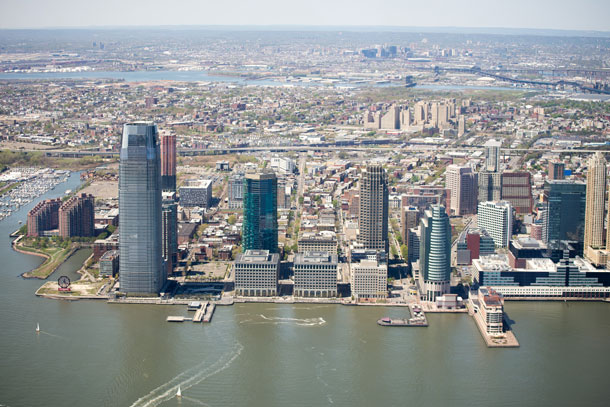
Newark has handed out 40,000 water filters to provide clean drinking water for the estimated affected population. (Photo: Massmatt, Flickr, CC BY 2.0)
BASCOMB: And are filters really adequate for filtering out lead?
OLSON: Well, if the filters are installed, right, and if they're maintained, those are two big if's, then they will remove lead. But there are problems for the vast majority of homes filters are really just a temporary stopgap measure to protect people while we're trying to fix the underlying problem. Basically, there are two things that a city like Newark needs to do to protect their citizens over the long term. First of all, they clearly need to treat their waters so it doesn't leach lead out of lead pipes. And secondly, we just need to pull all those lead pipes out of the ground. Even with a corrosion control treatment, it's not a full solution to the problem. Pipes are sort of a ticking time bomb. People can continue to be exposed to lead until they pulled out of the ground.
BASCOMB: Well, pulling out, this vast network of lead pipes digging up the streets putting in new pipes, I mean, that sounds really expensive. It's got to be a big hurdle for the city.
OLSON: It is a challenge. Many cities however, are doing this and have been doing it. So, you know, cities like Lansing, Michigan, Madison, Wisconsin, Milwaukee, other cities are starting to pull out or already have pulled out all their lead pipes. And you don't actually have to dig up the entire street and the entire front lawn, there is now, newer technologies where you can just dig a small pit at each end of the lead service line and pull a new pipe through while you pull out the old lead pipe. So, it's much cheaper and more efficient.
BASCOMB: Well, why are the EPA and the states dragging their feet on safe drinking water for people? I mean, why is this even an issue?
OLSON: There's a lot of political pressure against state government officials in some cases and against EPA, from anti-regulatory forces from city officials from water utility industry people that don't want to face enforcement action. So, they quietly have been pushing to cut EPA’s budget, to cut state budgets, and to put political pressure on the agencies to not bring enforcement action. And really it's created a culture that you can violate the law, you can violate the safe drinking water rules with impunity.
BASCOMB: Presumably, if there were enforcement actions, it would cost a municipality and the water providers a lot of money and they don't want that. And it's just become part of the culture to not enforce these laws, is that what you are saying?
OLSON: That's exactly right. I mean, we did a survey of enforcement actions and violations, we found that only three percent of the violations nationwide faced any threat of penalties. I think that sends a pretty clear signal you can imagine if you're on a highway, and everybody's speeding 40 miles an hour over the speed limit. And a cop is just sitting there watching everybody drive by and never pulling anybody over, what kind of signal that sends. And that's unfortunately, sort of where we are right now with our drinking water enforcement or lack of enforcement.

Erik Olson is the Senior Director of Health and Food with the Healthy People and Thriving Communities Program at the Natural Resources Defense Council. (Photo: Courtesy of the NRDC)
BASCOMB: Well, is there any bright side? Do you see any potential change in that or are cities or municipalities sort of taking it upon themselves to do the right thing in terms of providing safe drinking water?
OLSON: Yeah, I think that there are certainly responsible water utilities out there that are voluntarily starting to pull out their lead pipes. Lansing, Michigan, for example, pulled out all their lead pipes voluntarily. And there are other cities across the country that are starting to do this. So, I think there certainly are responsible members of the industry who want to do the right thing and view it as their responsibility. And honestly, I think as the new Congress is coming in, there are a lot of members who have recently been elected who said that they want to invest in our drinking water infrastructure. We know it's going to cost billions of dollars to fix these lead contamination problems and other drinking water contamination issues. And we're not starting to see Congress take an interest and I think there's a good chance that infrastructure legislation, especially if the public pushes hard, could address this issue and could help pay for pulling these lead pipes out of the ground. So stay tuned. I'm hopeful that maybe the new Congress coming in will make this a priority as well.
CURWOOD: That was Erik Olson of the NRDC speaking with Living on Earth’s Bobby Bascomb. The mayor of Newark, Ras Baraka, has told reporters quote, “At the end of the day, the city of Newark has done everything in its power to make sure we deal with and abate this issue in the city."
Related links:
- Natural Resources Defense Council | “What’s in Your Water? An Updated Analysis”
- American Academy of Pediatrics | “With No Amount of Lead Exposure Safe for Children, American Academy of Pediatrics Calls For Stricter Regulations”
- Natural Resources Defense Council | “What's in Your Drinking Water?” | Guide
- NJ.Com | “Newark Said Its Water Was Safe, but Email Reveals It Was Warned of Problems Months Ago”
- City of Newark | “Judge Strikes Down NRDC’s Emergency Motion for Water Filters In Newark’s East Ward”
[MUSIC: https://www.youtube.com/watch?v=3utMV9ITxsE
KUURO, “Aamon” Monstercat Recordings]
'Forest Bathing' for Health
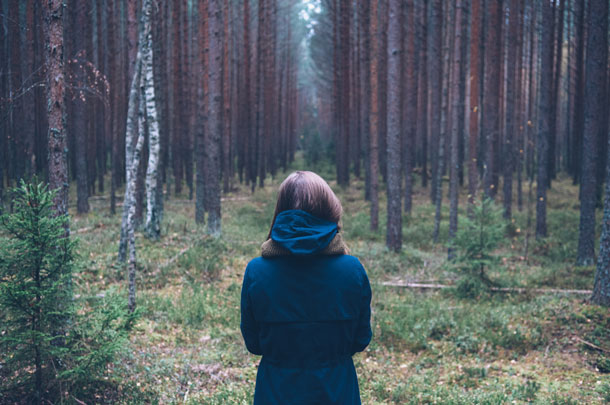
Studies show that 'forest bathing', or shinrin-yoku as it is known in Japan, appears to have health benefits. (Photo: Jordan Sanchez on Unsplash)
CURWOOD: Call it biophilia, love of the outdoors or simply common sense, research shows that spending time in nature can improve human health. In fact, the Japanese have a tradition known as shinrin-yoku or forest bathing, in which practitioners spend meditative time breathing in nature. Allegheny Front reporter, Kara Holsopple, went to Frick Park in Pittsburg to meet up with Moshe Sherman, a medical Qi Gong therapist who leads regular forest bathing outings.
SHERMAN: The first bathing started in Japan in the 80s as a form of preventative health care. And the idea is that in order to balance the stress of urban life, we need to expose ourselves to nature. And it's very simple. In fact, to just get yourself into nature and be present.
HOLSOPPLE: How is it different than taking a walk or hiking?
SHERMAN: Well, we don't have a destination in mind. And we don't rush just like when we take a bath in hot water, we settle in and relax, we can talk but it's not a time to talk about work like we might do during a walk with a friend or to complain about relationships. It's more time to go inward.
HOLSOPPLE: You're looking up.
SHERMAN: Yes, when we first bathe, we want to look all around and just take it in. So we breathe in the healing energy. We also bring it in through our eyes, we bring it in through our ears, hearing the sounds we bring in through feeling whether it's feeling the weather or touching a leaf. In Japan the term for forest bathing is shinrin-yoku and that literally means to bring in the forest.
HOLSOPPLE: Bring it in to yourself.
SHERMAN: Exactly, in the urban environment we often have to put up what I call energetic shields to protect us. I love cities. I've grown up in the city live in a city my whole life, but I can feel when I come into the forest. It's a chance for those shields to come down.
HOLSOPPLE: Even the muds kind of a soothing sound.
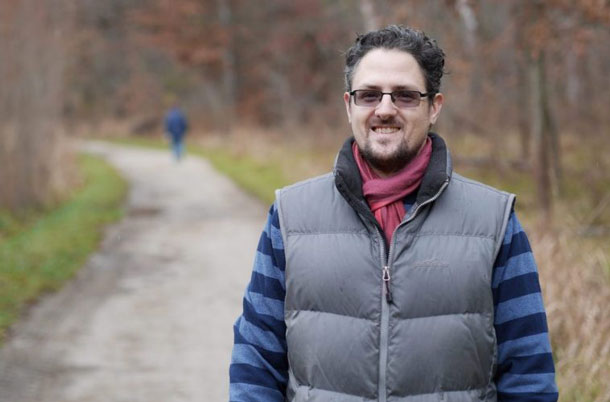
Moshe Sherman is a medical QiGong therapist who leads forest bathing sessions in Pennsylvania parks. (Photo: Kara Holsopple)
SHERMAN: Yes, it is. I was just listening to that as well. Each session is different. There was one session where we did a really fun exercise. We all put our hands on the same tree. And we did a guided meditation where we pretended we were squirrels running up the tree and we got to the top of the tree, looked around and ran back down. And at first I was wondering if anyone was there with me, if it's just me. I got some good feedback afterwards it was a lot of fun.
One of the nice things about forest bathing is it has been widely researched mostly in Asia and also in Europe. And what brought the most recent attention to the United States is a review that was published in summer of 2017 that looked at 64 of those research studies which are all based on empirical evidence, and it really impacts so many systems of the body, cardiovascular system, the respiratory system, and most profoundly, I think, to me right now is how it impacts the immune system. If you do one session of forest bathing for even 20 minutes, we see an increase in what's called the NK cells are the natural killer cells. And these are the cells that protect us from viruses and even from tumor formations.
HOLSOPPLE: Is it just the healing power of nature or something else going on? You know, like, what about being in nature is so good for us?
SHERMAN: There's many levels to it, I don't claim to understand them all. Trees emit something called phytoncides. And these are organic compounds that are released by trees to protect the trees themselves from parasites, disease, and they're actually beneficial for human health as well. So when we're around trees, and we're around plant life, we're breathing those in. I work with Chi or energy, which is a little more abstract, but I think of each tree and each plant as being a unique life form with its own consciousness. And I think when we expose ourselves to a variety of different life forms, it benefits us and I like to think of benefits trees as well, so I think it's a friendship.

Forest bathing advocates say even just a few minutes in a forest can help change your energy and mood. (Photo: Arnaud Mesureur on Unsplash)
HOLSOPPLE: What do people report to you? What do they say afterwards about the experience?
SHERMAN: Lots of times....
HOLSOPPLE: Does anybody hate it?
SHERMAN: No, I've never had anyone hate, or being unsatisfied, people usually feel more relaxed, more present. And really, when you start to talk to people, you realize that they're processing some heavy stuff that they're going through in their lives, and it helps them with that. People report feeling overall, better is the general feeling you get. I feel great people are chatty, which is always a good sign after a healing session or after a group event, when people feel chatty, it means the energies flowing it means they're feeling uplifted and feeling open to sharing and receiving.
HOLSOPPLE: I'm glad I didn't cancel.
SHERMAN: Me too. Yeah, this is great. You can feel the benefits almost immediately. And then notice how they last they last with you. Lots of times I'll feel them wearing off and that's when I'll get myself back to the park back to the forest. Once you learn how to forest bathe you can do it anytime you don't need a guide although it's more fun when you come do it with a group, but you can do it yourself once you know how to do it. So it's it's like that saying, you know, give a person a fish they eat for a day, teach them how to fish they can eat forever. I think forest bathing is so essential to modern life and creating a balance and health in the modern environment.
CURWOOD: Kara Holsopple’s report comes to us courtesy of The Allegheny Front. And by the way, Moshe Sherman says if you are in a crunch for time, simply sitting under a tree for a while can change your energy and mood.
Related links:
- This story on the Allegheny Front website
- The New York Times | “Take A Walk in the Woods. Doctor’s Orders.”
- A meta-analysis of the potential health benefits of spending time outdoors
- About how phytoncides may promote better health
- Cloud Gate Pittsburgh
[MUSIC: https://www.youtube.com/watch?v=GEeDMXgRBCg
The Beatles, “Within You and Without You,”]
CURWOOD: Just ahead, the destructive power of government shutdowns on America’s national parks and other public lands. Keep listening to Living on Earth.
ANNOUNCER: Funding for Living on Earth comes from you, our listeners, and United Technologies, combining passion for science with engineering to create solutions designed for sustainability in aerospace, building industries, and food refrigeration. UTC companies such as Otis, Carrier, Pratt and Whitney, and UTC Aerospace systems are helping to move the world forward. You can learn more about United Technologies by tuning into the Race to Nine Billion podcast; listen at racetoninebillion.com. This is PRI, Public Radio International.
[CUTAWAY MUSIC: https://www.youtube.com/watch?v=15IHNYq6stw
Chick Corea and Gary Burton, Tiny Desk Concert]
The Conservation Costs of Shutdowns
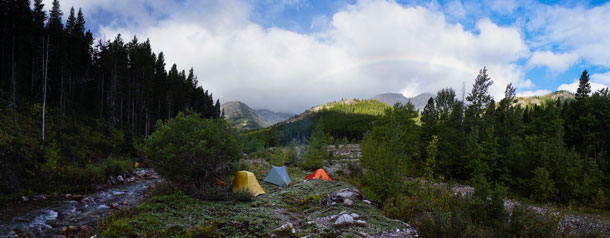
The Bob Marshall Wilderness Area in Montana is overseen by the U.S. Forest Service under the Department of Agriculture. (Photo: Troy Smith, Flickr, CC BY-NC-ND 2.0)
CURWOOD: It’s Living on Earth, I’m Steve Curwood.
When the United States government began a partial shutdown on December 22nd after the Republican Congress and President Trump could not agree on funding for a southern border wall, many national parks were left open without adequate personnel. The results have been disastrous and even fatal for some park patrons, according to Sally Jewell who served as Secretary of the Interior during the Obama administration. And even though trash piled up in the parks the Trump Administration kept paying many Interior Department officials who deal with oil and gas and are expediting the plans to drill in the Arctic National Wildlife Refuge. Sally Jewell is currently a Distinguished Fellow in the College of the Environment at the University of Washington and joins us now. Thank you for taking the time to be with us today, Sally!
JEWELL: It's my pleasure. Thanks for having me, Steve.
CURWOOD: So, Madam Secretary, in the past, national parks have been close to the public during government shutdowns. But during this most recent confrontation, the current administration chose to keep the parks open. How wise was that decision to keep them open?
JEWELL: Well, I think it was an incredibly unwise decision, having the doors to the parks open, but with a limited number of people puts those resources and the people that visit them at risk.
CURWOOD: And I gather, a number of people have died.
JEWELL: Yeah, my understanding was, the last count was seven. I will say that's not surprising, and I wouldn't be surprised if the number continues to go up. The reality is, people can hurt themselves in parks. And much of what happens with the rangers who are not on staff is closing trails, where there are additional risks is advising visitors and helping them understand the risks they face. And when somebody does have a circumstance that impacts them, it's launching a search and rescue operation. Those people that do search and rescue are many different people within the Park Service, not just law enforcement, and the fact that they're all furloughed would make it very difficult for people to respond in the case of an emergency, and, therefore, the risks would increase.
CURWOOD: Now, I believe there are a total of 59 national parks, but the department you ran the Interior Department and the Park Service is responsible for many more facilities - national monuments, National Historic Places, over 400 or something?
JEWELL: Yeah, over 400 units of the National Park Service and, and some are large national monuments that are designated monuments, some are called parks, some are historic buildings and structures. So, it's a wide variety of our nation's treasures, whether they be historic, cultural, or natural treasures.
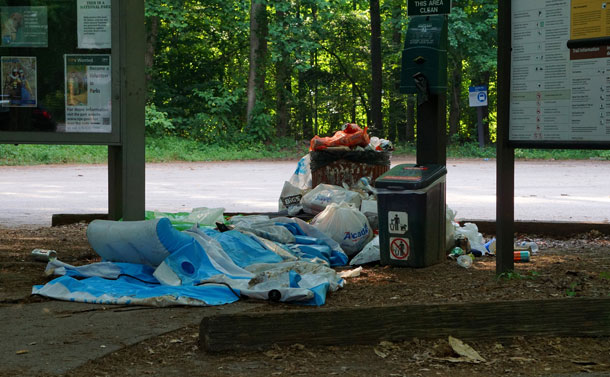
During the 2018-2019 shutdown trash piled up in National Parks. (Photo: Steve Harwood, Flickr, CC BY-NC 2.0)
CURWOOD: And under the Trump administration, then under the shutdown, these places are simply left open, really, without supervision.
JEWELL: Oh, that's true for a lot of them. But the historic buildings, for example, are locked as I understand it, but places like the National Mall, which is sort of the front door, if you will, to our nation's capital are open, but with very limited staff, and no restrooms. And, of course, we've all seen pictures of garbage piling up. But more importantly, it puts those assets that remind us of our history and our past in a vulnerable position to vandalism, souvenir taking and bad action. And the number of law enforcement people that are on staff can't possibly be the eyes and ears that the National Mall or other parks need to make sure that these places are protected.
CURWOOD: Sally Jewell, of course, you ran the Department of Interior, but there are a lot of conservation places that are under the Department of Agriculture. The National Forest system, for example, thinking of the Bob Marshall wilderness, which is a place that you can't even get to in an automobile. You have to either walk or take a horse. How are those places doing under the Trump administration's decision not to supervise places like that?
JEWELL: Well, they are in a very similar situation to the national parks, people are going into the backcountry in places that are overseen by the US Forest Service. The campgrounds are not getting service, the restrooms aren't getting cleaned, people will get lost on the trails, you have dogs going off leash in areas where that's not allowed, which impact wildlife. So, really, it's very much the same situation for the US Forest Service as it is for the National Park Service and the Bureau of Land Management and any other agencies that oversee public lands. They all have vulnerabilities and they're all being impacted.
CURWOOD: During the shutdown, a number of facilities move to have some people there anyway, using funds. I gather, these are coming from entrance fee funds. How is that possible? How legal even is that?
JEWELL: Well, when I was at Interior, it was very clear that our legal counsel of the solicitor's office, and the Justice Department felt that that was not an appropriate use or illegal use of those funds. What that does is it takes those visitor services fees from the things they were intended for, like deferred maintenance, like bringing in outside resources to supplement the operational resources of the park. So, I don't think it's an appropriate use. And neither is it a sustainable use of those funds. They should be used for their intended purpose.
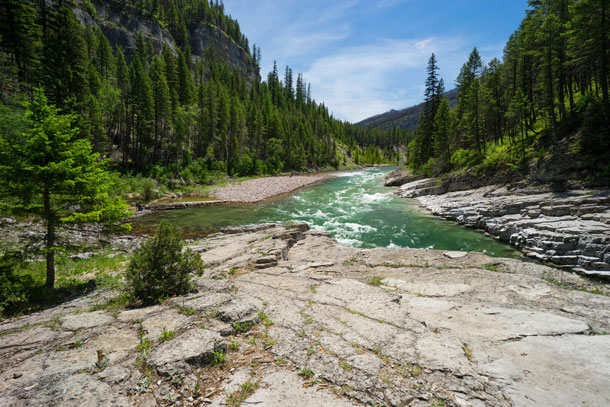
The Bob Marshall Wilderness Area in Montana is overseen by the U.S. Forest Service under the Department of Agriculture, which was subject to the 2018-2019 federal government shutdown. (Photo: Troy Smith, Flickr, CC BY-NC-ND 2.0)
CURWOOD: You devoted a lot of your career to taking care of the outdoors and conservation. How do you feel about the shutdown on its impact on our National Conservation system?
JEWELL: I am very, very worried about the long-term impacts of the shutdown from so many different angles. First, the National Park Service was created, and I'll quote directly from the Organic Act: “to conserve the scenery and the natural and historic objects and the wildlife therein, and to provide for the enjoyment of the same and such manner and by such means as will leave them unimpaired for the enjoyment of future generations.” When we have a government shutdown. Not only do we have increased risks to the assets the park is protecting, and the people that come and visit but we have a break in the data from the science that is very prevalent throughout the park, we have the disruption of visitor services, we have - and I know one of the hardest things I had to deal with was - people whose weddings were planned that had to be cancelled because they couldn't get into the park facility.
But I would say one of the biggest impacts of the shutdown that is long term is the impact on the employees, the morale, the fact that when they come back to work, they are faced with cleaning up this mess. Can you imagine you are a scientist and all of a sudden you're diverted with everybody else, to cleaning up human feces from the parking lots or all of the garbage that has blown into the sensitive natural areas that you're required to protect? And when your career has been around protecting these resources and understanding the impacts and removing invasive species and educating people that come and visit to come back multiple weeks later after a shutdown. And to be faced with both the visual and the olfactory and the deep, personal sense of offense you would feel when you walk there, it is just demoralizing. And we need people to want to be public servants, to be appreciated for being public servants. And that is hard to quantify, but very, very damaging with a shutdown of this nature and, frankly, of the shutdown that I experienced back in 2013 as well.
CURWOOD: When you ran the Interior Department, of course, you not only had the Park Service under you, you had Fish and Wildlife Service, you had the folks that handle the extraction of energy from public lands offshore and onshore. To what extent has this shut down put the regulation and care of energy extraction of oil drilling at risk? And to what extent does this damage the Fish and Wildlife Service ability to take care of things like endangered species and such?
JEWELL: When the Department of the Interior facilitates the development of resources on public lands like offshore oil and gas development, or mining or mineral development or wind energy or solar energy, it requires an understanding of the impact of those activities on the landscape and the partnership with the organization that's being permitted to do things in a safe and responsible way. When the government is shut down, the work, for example, on environmental impact statements is truncated, the Fish and Wildlife Service is a key partner of a number of other agencies as environmental impacts are being assessed. They are unable to be doing the evaluation of species that they need to. For example, Fish and Wildlife Service looks at migratory birds, migratory ungulates, are they, in fact, transiting this area during this specific period of time and how does that correlate to other years. They're losing not only the data associated with the shutdown period, but they are losing forever, the ability to correlate what that data would say, with the environmental conditions that might influence those species.
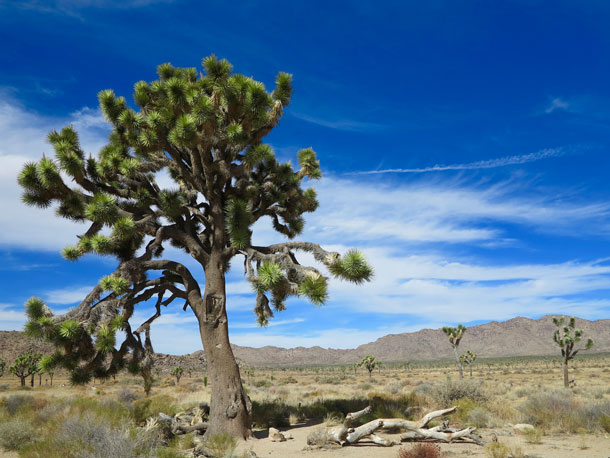
Joshua Tree National Park was temporarily closed to the public after sustaining damage during the 2018-2019 government shutdown. (Photo: Kyle Wicomb, Flickr, CC)
CURWOOD: So, what kinds of assets are risk in the national parks and monuments and such if people have access without regulation, without people to watch over them?
JEWELL: Without having appropriate controls, there is a risk that poachers will come and take some of those plants or animals and use them for their own purposes, which undermines that overall ecosystem and the sustainable use of those products within the ecosystems. You've got in some cases, like Joshua Tree, it's been reported where people have driven off-road vehicles on the sensitive cryptobiotic crust which will not recover, it will stay with those imprints of tires or footprints for hundreds of years. These are the kinds of things that people may or may not recognize, but there is damage that is being done right now.
CURWOOD: Then over National Forest side, hey, grab the chainsaw. Nobody's around.
JEWELL: That's right. One of the things that happen to Olympic National Park during the last shutdown is people poaching old growth trees right from the National Park. While there was law enforcement there, I mean, that's a couple million acres, there's no possible way that people can police something like that with limited capacity. This is, I'm sure, happening throughout our national forests and our national parks right now.
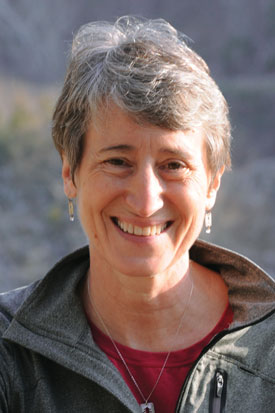
Sally Jewell is the United States' 51st Secretary of the Interior. (Photo: Courtesy of Washington University)
CURWOOD: A nightmare. Throughout the nation, there have been small groups of volunteers who tried to just step in and take out the trash in the national parks themselves. What do you think that says about the importance of our national parks, indeed, our natural resources to the public?
JEWELL: In the United States, we are unique in that the best places, the places that are the most spectacular, the most beautiful, with a richness of wildlife and wildlands that other countries don't have. We have set these lands and these special places aside for the benefit of all Americans. In other countries, oftentimes, they're owned by the nobility, or the kings and queens there in the private estate. In the United States, our best assets are in the public estate, and people love them as one of my predecessors, Dirk Kempthorne said, the national parks are not Republican national parks, or Democratic national parks. They are America's national parks. And that is true for so many of our public lands and our wildlands, people cared deeply and I saw this across the political spectrum about these places, they want to see them preserved and protected, not just for now, but for the generations to follow. And a shutdown like we have had under this administration, and the shutdown that I experienced during the Obama administration does so much to undermine both the public's ability to enjoy these resources. And the importance of the long-term protection of these resources, to have the parks open to have people running roughshod over them without the ability to appropriately care for them or interpret them is really a travesty for all of the American people who care so deeply about these special places.
CURWOOD: So, how you feeling?
JEWELL: I am feeling terrible about the shutdown. I'm really feeling sick about the message that it sends to the men and women who work for the federal government about their value. I'm sick about the impact on the science that we're not going to get back I am sick about the poaching that I know is going on the vandalism that I know is going on the artifacts that I know are being slipped into people's pockets, the work that would be done to help protect our forests from fires, the work that would be done to reduce the risk of invasive species, all of these things are put on hold. And all of that has long-term consequences for these places that we all own every one of us that are vulnerable if we're not there to care for them.
CURWOOD: Sally Jewell is the former Secretary of the Interior and currently a distinguished fellow, the College of the Environment at the University of Washington in Seattle. Thanks so much for taking the time with us today.
JEWELL: Thanks for the opportunity. Steve. It's been a pleasure.
Related links:
- Sally Jewell's Twitter page
- The New York Times “The Shutdown’s Lasting Damage to Joshua Tree”
- National Parks Service’s official statement on keeping the National Parks open
[MUSIC: https://www.youtube.com/watch?v=Nb3vj9zTHX0
Vadim Chaimovich, Chopin’s “Nocturne in B-flat minor, Op. 9, No. 1”]
[Bird Calls: Rhinoceros Auklets]
CURWOOD: We leave you this week – in the company of some extraordinary creatures and their babies.
[More Rhinoceros Auklet Calls]
CURWOOD: These are several rhinoceros auklets with their chicks – recorded at Protection Island National Wildlife Refuge in the Strait of Juan de Fuca off the Pacific Coast. Rhinoceros Auklets are relatives of puffins; medium sized dark grey duck-like birds that spend their days at sea, and then return at night with fish for their single chick hiding deep in a burrow.
[More Rhinoceros Auklet Calls]
CURWOOD: Jeff Rice recorded these birds in the middle of a July night, with support from the Acoustic Atlas at Montana State University.
[MUSIC: https://www.youtube.com/watch?v=ssV7g1eA2Uc&list=PLR2yZ-vJ-Te2QCFdEA_jHpjnwyEYYrt0i&index=11
George Duke, “My Bells” on After Hours, Warner Bros. Records Inc.]
CURWOOD: Living on Earth is produced by the World Media Foundation. Our crew includes Naomi Arenberg, Bobby Bascomb, Thurston Briscoe, Jenni Doering, Don Lyman, Lizz Malloy, Aynsley O’Neill, Jake Rego, Adelaide Chen, and Jolanda Omari. Tom Tiger engineered our show. Alison Lirish Dean composed our themes. You can hear us anytime at L-O-E dot org, iTunes and Google play- and like us, please, on our Facebook page - PRI’s Living on Earth. We tweet from @livingonearth. And find us on Instagram at livingonearthradio. I’m Steve Curwood. Thanks for listening!
ANNOUNCER: Funding for Living on Earth comes from you, our listeners, and from the University of Massachusetts, Boston, in association with its School for the Environment, developing the next generation of environmental leaders. And from the Grantham Foundation for the protection of the environment, supporting strategic communications and collaboration in solving the world’s most pressing environmental problems. Support also comes from the Energy Foundation, serving the public interest by helping to build a strong, clean, energy economy and from Carl and Judy Ferenbach of Boston, Massachusetts.
ANNOUNCER 2: PRI, Public Radio International.
Living on Earth wants to hear from you!
Living on Earth
62 Calef Highway, Suite 212
Lee, NH 03861
Telephone: 617-287-4121
E-mail: comments@loe.org
Newsletter [Click here]
Donate to Living on Earth!
Living on Earth is an independent media program and relies entirely on contributions from listeners and institutions supporting public service. Please donate now to preserve an independent environmental voice.
NewsletterLiving on Earth offers a weekly delivery of the show's rundown to your mailbox. Sign up for our newsletter today!
 Sailors For The Sea: Be the change you want to sea.
Sailors For The Sea: Be the change you want to sea.
 The Grantham Foundation for the Protection of the Environment: Committed to protecting and improving the health of the global environment.
The Grantham Foundation for the Protection of the Environment: Committed to protecting and improving the health of the global environment.
 Contribute to Living on Earth and receive, as our gift to you, an archival print of one of Mark Seth Lender's extraordinary wildlife photographs. Follow the link to see Mark's current collection of photographs.
Contribute to Living on Earth and receive, as our gift to you, an archival print of one of Mark Seth Lender's extraordinary wildlife photographs. Follow the link to see Mark's current collection of photographs.
 Buy a signed copy of Mark Seth Lender's book Smeagull the Seagull & support Living on Earth
Buy a signed copy of Mark Seth Lender's book Smeagull the Seagull & support Living on Earth

